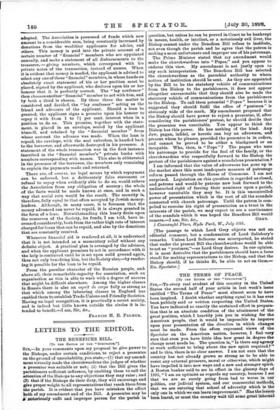LETTERS TO THE EDITOR.
THE BENEFICES BILL.
[To THE EDITOR OF THE " SPECTATOR:9 SIR,—In your comments upon my proposal to give power to the Bishops, under certain conditions, to reject a presentee on the ground of unsuitability, you state,—(1) that my amend- ment virtually made the churchwardens the judges of whether a presentee was suitable or not; (2) that the Bill gives the parishioners sufficient influence, by enabling them to call the attention of the Bishops to any objections they may raise ; and (3) that if the Bishops do their duty, they will encourage and give proper weight to all representations that reach them from the parish. It is evident that you have mistaken the effect both of my amendment and of the Bill. A presentee may be ttotoriously unfit and improper person for the parish in
question, bat unless he can be proved in Court to be bankrupt in means, health, or intellect, or a notoriously evil liver, the Bishop cannot under the Benefices Bill refuse to institute, not even though the parish and he agree that the patron is making a most unfortunate and improper use of his patronage.
The Prime Minister stated that my amendment would make the churchwardens into " Popes," and you appear to endorse this view. My amendment is not justly open to any such interpretation. The Benefices Bill has selected the churchwardens as the parochial authority to whom notices of institution should be sent. As they are appointed by the Bill to be the statutory vehicle of communications from the Bishop to the parishioners, it does not appear altogether unreasonable that they should also be made the statutory vehicle of communications from the parishioners to the Bishop. To call them potential " Popes " because it is suggested they should fulfil the office of " postmen " is obviously wide of the mark. My amendment proposed that the Bishop should have power to reject a presentee, if, after considering the parishioners' protest, he should decide that the presentee was unsuitable. You appear to think the Bishop has this power. He has nothing of the kind. Any Jew, pagan, infidel, or heretic can buy an advowson, and present whom he pleases, provided the presentee is in orders,. and cannot be proved to be either a blackguard or an
incapable. Who, then, is " Pope " The pagan who uses his patronage to provide for the fool of the family, or the churchwardens who respectfully forward to the Bishop the protest of the parishioners against a scandalous presentation
I am informed that the value of advowsons has gone up in the market since this most inadequate measure of patronage reform passed through the House of Commons. I am not surprised. Legislation on this question is regarded as closed, and patrons and would-be patrons now look forward to the undisturbed right of forcing their nominees upon a parish, however unsuitable they may be. It is this uncontrolled power of presentation which is the root of all the scandals connected with church patronage. Until the patron is com- pelled to exercise his right of presentation as a trust in the interests of the parish, we may expect to see a continuance of the scandals which it was hoped the Benefices Bill would
remove.—I am, Sir, &c., GREY. 1 Connaught Place, Hyde Park, W., July 28th.
[The passage to which Lord Grey objects was not an editorial comment, but a condensation of Lord Salisbury's remarks. Unless Lord Selborne was misreported, he stated that under the present Bill the churchwardens would be able to act as "postmen,"—as Lord Grey desires. In our opinion, it is most desirable that the parishioners should have a locus- standi for making representations to the Bishop, and that the- Bishop should, if he thinks fit, be able to act on them.— ED. Spectator.]


































 Previous page
Previous page